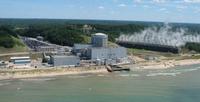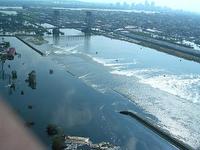-
Mayor suggests student fee to hire more police, firefighters for local college’s sporting events
Morgantown, West Virginia mayor Jim Manilla wants to hire more police officers and firefighters to deal with street fires, riots, and other incidents following West Virginia University sporting events, and he wants the students to pay for it
-
-
New Jersey “Texting against Terror” program a success
A $5.8 million federally funded program allowing New Jersey Transit commuters to “text against terror” has received 307 tips to the agency since the program started in June 2011; of those 307 messages, seventy-one have “referred to something regarding homeland security,” said Christopher Trucillo, chief of N.J. Transit Police
-
-
NRC sees no evidence of bad security practices at Michigan nuclear plant

The Nuclear Regulatory Committee (NRC) released information last week about a leak earlier this summer at the Palisades plant near South Haven, Michigan; the plant has been mired in controversy this year, as at least three water leaks have occurred in the past several months, and the plant has one of the worst safety ratings in the United States
-
-
Small airports face reduction in TSA funding for security measures
The Transportation Security Administration (TSA) is reducing funding designated to help smaller airports provide law enforcement officers at passenger screenings; since the 9/11 attacks, the TSA mandated that one law enforcement officer be present when commercial passengers are screened at airports; the TSA has now changed the way it circulates funding for this program, reducing the number of hours an officer has to work and the amount he or she will be paid
-
-
Senate panel’s report harshly criticizes role, utility of DHS fusion centers
A 2-year bipartisan investigation by the U. S. Senate Permanent Subcommittee on Investigations has found that DHS efforts to engage state and local intelligence “fusion centers” has not yielded significant useful information to support federal counterterrorism intelligence efforts; the report says that senior DHS officials were aware of the problems hampering effective counterterrorism work with the fusion centers, but did not always inform Congress of the issues, nor ensure the problems were fixed in a timely manner; DHS estimates that it has spent somewhere between $289 million and $1.4 billion in public funds to support state and local fusion centers since 2003 (the report says that these are broad estimates which differ by over $1 billion); the Senate investigation raises questions about the value this amount of funding and the contribution the fusion centers make to the U.S. counterterrorism efforts; not everyone agrees with the report; Rep. Peter King (R-NY), chairman of the House Committee on Homeland Security, said: “I agree with Chairman Joe Lieberman and Ranking Member Susan Collins [of the Senate Committee on Homeland Security] that the subcommittee report issued this week paints with too broad a brush an incomplete picture that fails to recognize many of the important contributions that fusion centers have made in securing our Homeland”
-
-
The Western hemisphere’s largest seawater desalination plant to be built in California

The San Diego County Water Authority announced plans to build the Western hemisphere’s largest seawater desalination plant; the plant will produce fifty million gallons of fresh water per day, enough to supply about 7 percent of the San Diego region in 2020
-
-
Experts trying to determine cause of a giant Louisiana sinkhole

The earth near Bayou Corne, Louisiana opened on 2 August: a 300-foot-wide sinkhole, with depth varying between 50 and 300 feet, suddenly opened up in an area, and the authorities have been trying to determine whether the sinkhole was caused by the collapse of an abandoned brine mining cavern along the margin of the Napoleonville Salt Dome or by something else
-
-
Debate over causes of levee failure during Katrina intensifies

A court case in which residents of two sections of New Orleans are suing a construction group has put millions of dollars at stake; residents of the Lower 9th Ward and St. Bernard Parish residents claim that Washington Group International (WGI), an Amy Corps of Engineers contractor, removed several buildings and pilings from land along the Industrial Canal as part of a construction plan to expand the canal’s shipping lock, then failed adequately to plug the holes left behind; the holes allowed rainwater from Hurricane Katrina to seep underneath the 14-foot wall, essentially lifting the wall and allowing the areas to be flooded
-
-
GAO: Easily obtained counterfeit IDs present real risks

The Government Accountability Office (GAO) released a report in which the agency demonstrates that counterfeit documents can still be used easily to obtain valid driver’s licenses and state-issued identification cards under fictitious identities; GAO recommended that DHS exert more assertive leadership in an effort to correct the problem
-
-
Repair bill for Miami-Dade water and sewage system: $12 billion
Repairing, replacing, and rebuilding 13,000 miles of old water and sewage pipes and the treatment plants they connect to could cost Miami-Dade County, Florida more than $12 billion dollars over the next fifteen years; this is a staggering amount – made even more so in light of the fact that this is considerably more than the original estimate of $1 billion
-
-
Georgia’s Plant Vogtle reviving hopes for nuclear power in U.S.
Plant Vogtle, located in Burke County, Georgia, is one of the most watched construction projects in the world; it is currently going through a $14 billion dollar expansion, which includes the first new commercial reactors built in the United States in decades
-
-
Desalination losing ground as a solution to California’s chronic water shortage
According to the July 2011 census, more than thirty-seven million people live in California, increasing the pressure on the state’s water sources; desalinating sea water as a solution to the scarcity of fresh water is not a new technology — it has been around for more than four decades — but it has more recently been considered as a way to address California’s chronic, and growing, water shortage; a closer examination of the technology and its cost has cooled the initial enthusiasm for it
-
-
Maryland rolls out public safety interoperable communication system
To be better prepared for man-made or natural disasters, Maryland leaders have decided to develop Twelve Core Capacities for Homeland Security, picking the deployment of an interoperable communications system as the highest priority; on 5 June 2012, Governor Martin O’Malley inaugurated the state’s new network, known as the Maryland First Responders Interoperable Radio System Team (Maryland FiRST)
-
-
New York unprepared for flooding, sea level rise

New York City may be a fast paced city of bright lights, sleek attitudes, fashion trends, and some of the best sports teams in the country, but underneath the glitz and glamour is a city which is not prepared for an act of God and which is being threatened by rising sea levels and severe storm flooding; “It’s a million small changes that need to happen,” one expert says
-
-
LAPD wants to know why you are taking these photos
If you live in Los Angeles and decide to take some pictures of a few monuments or public places to send to friends and family or for your own private collection, the Los Angeles Police Department (LAPD) may see you as a potential threat to public safety
-
- All
- Regional
- Water
- Biometrics
- Borders/Immig
- Business
- Cybersecurity
- Detection
- Disasters
- Government
- Infrastructure
- International
- Public health
- Public Safety
- Communication interoperabillity
- Emergency services
- Emergency medical services
- Fire
- First response
- IEDs
- Law Enforcement
- Law Enforcement Technology
- Military technology
- Nonlethal weapons
- Nuclear weapons
- Personal protection equipment
- Police
- Notification /alert systems
- Situational awareness
- Weapons systems
- Sci-Tech
- Sector Reports
- Surveillance
- Transportation
Advertising & Marketing: advertise@newswirepubs.com
Editorial: editor@newswirepubs.com
General: info@newswirepubs.com
2010-2011 © News Wire Publications, LLC News Wire Publications, LLC
220 Old Country Road | Suite 200 | Mineola | New York | 11501
Permissions and Policies
Editorial: editor@newswirepubs.com
General: info@newswirepubs.com
2010-2011 © News Wire Publications, LLC News Wire Publications, LLC
220 Old Country Road | Suite 200 | Mineola | New York | 11501
Permissions and Policies
